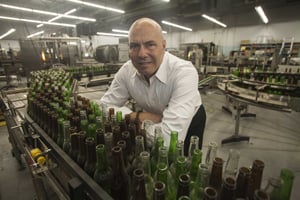
Steve Calhoun, shepherding the company his father founded in 1958, was ready to expand. After all, his business, Industrial Dynamics Co., which makes high-speed, high-precision inspection machinery for the bottling industry, was booming – especially in Europe and Asia.
In search of capital to finance an overseas sales push, Calhoun was faced with a question not uncommon to business owners in his position: borrow and incur debt or bring in a partner and give up equity in the family business?
After a process that took more than a year, he this month closed a deal with New York private equity firm SFW Capital Partners for a stake in his company, which does business as Filtec.
Though the parties wouldn’t discuss terms, Calhoun said it left him in control of the business and better positioned to expand aggressively. He now expects to double his sales in five years, mostly by entering new territories. The Torrance company has already opened sales and service offices in Brazil and Australia in the past year, and it is working on a new office in Thailand, and then plans to open two offices in China after that.
Meanwhile, he will invest heavily in improving old products, and developing new products and software.
Calhoun went the private equity route because he thought it less risky than pursuing debt financing.
“When you have a company like this that’s privately held, and 99 percent of your total net worth is tied up in the company,” said Calhoun, Filtec’s owner and chief executive, “you have to be a little bit cautious. You have to have some financial backup. I mortgaged my house, and I put everything I had into this company. … I just feel better not to have everything tied up to the company and then put it in debt.”
What’s more, private equity investors generally take an active role in managing their portfolio companies, bringing expertise that helps maximize their investment. Among SFW’s stated aims, for example, is working closely with management “to support the development of each company’s strategic plan and initiatives to improve growth, profitability (and) operational effectiveness.”
Ahmad Sheikh, a principal at SFW, will join Filtec’s board and said he would seek to help it improve management, sales and marketing as well as relationships with vendors and clients. His intention is to “work through all the major options that we could potentially get the company in.”
Milking profits
Though its business now is built on inspecting bottles as they go through the production process for companies such as Coca-Cola Co., PepsiCo. Inc., SABMiller Co. and Anheuser-Busch InBev, Filtec traces its origins to the heyday of Southern California’s aerospace industry.
Steve’s father, Fred, was a mechanical and electronic engineer with Hughes Aircraft Co., working on special projects, including Hughes’ nuclear missile contracts. Dissatisfied with the work, he started Industrial Dynamics in 1958 to make machinery to inspect milk bottles. The company came to be known as Filtec, after the first fill-level detector he invented.
Steve Calhoun took over the business in 2004, two years after his father died, and began making efforts to expand the company’s footprint in international markets.
Located in a 120,000-square-foot building, it now employs about 200, 130 of which work in the factory, building the machinery that it ships to customers. Fully vertically integrated, it does everything in-house, from design to fabrication and assembly to testing.
International sales now account for more than 70 percent of the company’s revenue. Though most equipment is sold overseas, Calhoun has insisted on manufacturing everything in Torrance.
“To maintain the level of quality that we require and to make sure that machines are checked out,” he said, “I’d like to have it controlled in one factory.”
The company has expanded to a range of machinery, including ones that detect fill level, cleanliness of empty bottles, contaminants as well as make sure labels match contents.
“These products may sound simple as they are just checking fill level, but fill level is being checked at 1,300 bottles a minute,” said Sheikh. “It utilizes very sophisticated image-capturing technology.”
SFW’s investment will also help Filtec move beyond its traditional technological strength in the glass bottle market. While it’s possible to use the same machine to inspect both glass and plastic bottles, Calhoun said, the use of plastic bottles has increased tremendously in the past decade, to a point that the company should invest in machines for plastic bottles to secure the growth.
An April report by London market intelligence firm Euromonitor found glass bottles are increasingly being replaced by lower-cost plastic bottles, especially among alcohol manufacturers, as consumers are more sensitive to prices while more accepting of plastic bottles. Last year, the use of plastic bottles expanded by 6 percent.
Sheikh said the competitive value of these instruments lies in their reliability and durability; they have to function well in all kinds of environment, such as dust or moisture environment, for years.
“The No. 1 criteria is the line can’t go down,” he said. “You can’t have the whole production shut down for two days because the inspection instrument isn’t working.”
